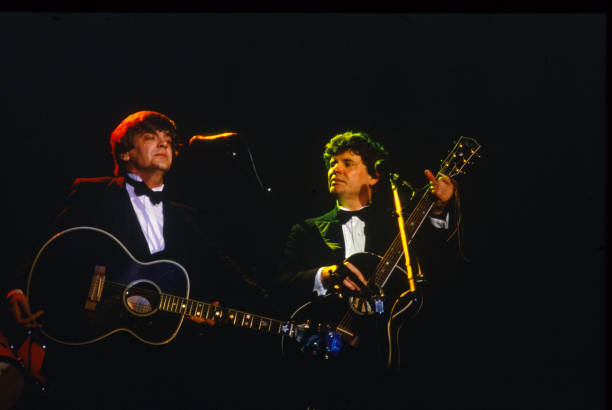 Introduction and Short Summary of the Song
Introduction and Short Summary of the Song
“Ebony Eyes” is one of The Everly Brothers’ most dramatic and emotionally intense recordings, released in 1961 as a double A-side single with “Walk Right Back.” While “Walk Right Back” is upbeat and romantic, “Ebony Eyes” is a tragic ballad, telling the heartbreaking story of a young soldier awaiting his fiancée’s arrival by plane, only to learn that she has perished in a crash. The track is unusual in the Everly catalog for its spoken-word narrative, combined with mournful harmonies that heighten the emotional weight. It remains one of their most striking examples of storytelling through song.
Origins of the Song
“Ebony Eyes” was written by John D. Loudermilk, a songwriter known for crafting narrative-driven songs with strong emotional impact. Loudermilk’s style often combined traditional storytelling with contemporary pop sensibilities, and “Ebony Eyes” is one of his darkest compositions.
---> Scroll down for the VIDEO
At the time of its release, the Everly Brothers were among the most successful acts in the world, with Warner Bros. eager for strong material to sustain their chart dominance. Pairing “Ebony Eyes” with “Walk Right Back” provided a balance between commercial accessibility and artistic daring, offering listeners both joy and tragedy on the same single.
Why The Everly Brothers Released “Ebony Eyes”
The Everly Brothers recorded “Ebony Eyes” because it allowed them to expand their repertoire into dramatic storytelling. By 1961, they were experimenting with new forms and sounds, and “Ebony Eyes” offered something unique: a ballad that combined traditional harmony singing with spoken recitation.
---> Scroll down for the VIDEO
The release also reflected their desire to showcase versatility. While much of their success had come from teenage love songs and playful rock-and-roll numbers, “Ebony Eyes” demonstrated they could also handle somber narratives of loss and death with conviction.
The Message Conveyed in the Song
The central message of “Ebony Eyes” is one of tragedy, grief, and the cruel unpredictability of fate. A young man awaits the arrival of his fiancée, describing her beauty and his devotion to her. The mood shifts when he learns her plane has crashed, leaving him heartbroken and alone.
Key themes include:
-
Love and Devotion: The narrator’s deep affection for his bride-to-be is clear throughout.
-
Tragedy and Loss: The sudden death of his beloved turns joy into despair.
-
Fate and Fragility: The song emphasizes how quickly happiness can be destroyed.
-
Emotional Vulnerability: The spoken section conveys raw grief in a way singing alone might not capture.
This combination of love and sudden catastrophe made the song memorable and emotionally devastating for listeners.
The Recording and Musical Characteristics
“Ebony Eyes” is musically distinctive within the Everly Brothers’ body of work.
-
Vocals: The brothers’ harmonies appear mainly in the sung sections, while Don delivers a spoken monologue in the middle, heightening the drama.
-
Instrumentation: Orchestral backing, including strings, adds a solemn atmosphere to the track.
-
Mood: Somber, dramatic, and haunting, with a cinematic quality unusual for early 1960s pop.
-
Style: A blend of traditional balladry and orchestral pop, showing influence from both country storytelling and theatrical narrative songs.
The spoken passage, describing the discovery of the fiancée’s fate, remains one of the song’s most striking features, creating a sense of intimacy and despair.
Cultural and Commercial Impact
Commercially, “Ebony Eyes” had mixed fortunes. In the United States, it was overshadowed by “Walk Right Back,” which became the dominant side of the single. However, in the United Kingdom, “Ebony Eyes” struck a chord with listeners, reaching No. 1 on the UK Singles Chart in early 1961. Its success there demonstrated the international appeal of the Everlys’ music and the willingness of UK audiences to embrace darker, more dramatic material.
Culturally, the song was notable for its departure from typical pop subject matter. At a time when most singles focused on romance or lighthearted fun, “Ebony Eyes” confronted listeners with death and grief. Its boldness helped broaden the emotional scope of popular music.
Legacy of “Ebony Eyes”
Today, “Ebony Eyes” is remembered as one of The Everly Brothers’ most unusual and daring recordings. While it did not achieve the same iconic status in the United States as their biggest hits, it remains beloved among fans and continues to stand out for its dramatic storytelling.
For their legacy, the song highlights their willingness to take risks and explore themes beyond youthful romance. It also underscores their mastery of harmony: even in a song dominated by narrative, their voices add depth and pathos.
More broadly, “Ebony Eyes” reflects the influence of country and folk storytelling traditions within popular music. By adapting Loudermilk’s tragic narrative into a polished pop ballad, the Everlys showed how songs could address life’s darkest moments while still reaching a wide audience.
Over sixty years after its release, “Ebony Eyes” continues to move listeners with its haunting story of love and loss. It stands as a testament to The Everly Brothers’ versatility, their emotional sincerity, and their ability to transform even the bleakest material into a timeless musical experience.